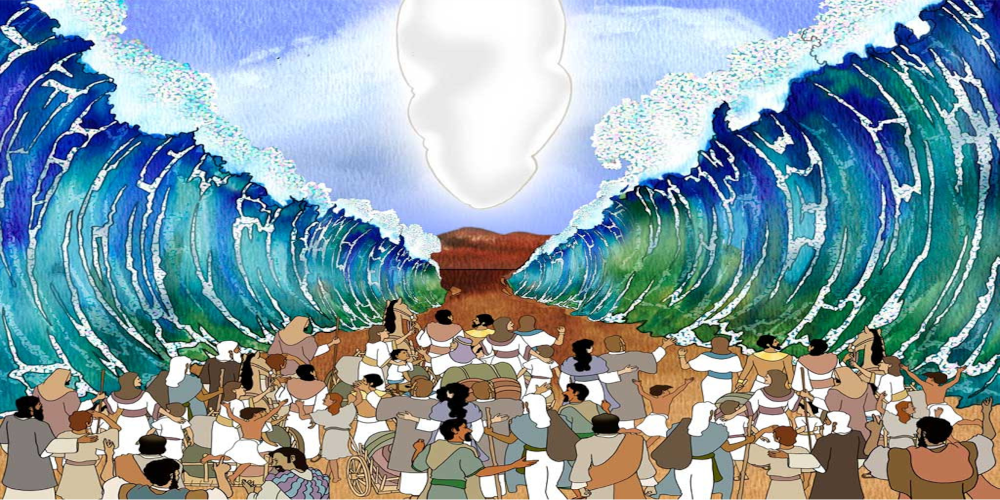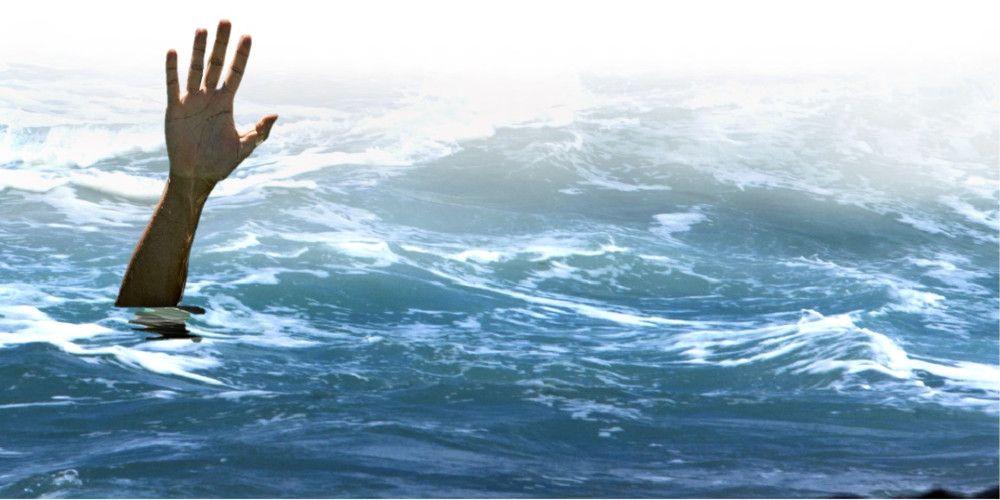

Baptism
1. The Baptism of the Israelites
“For I do not want you to be ignorant of the fact, brothers and sisters, that our ancestors were all under the cloud and that they all passed through the sea. 2 They were all baptized into Moses in the cloud and in the sea. 3 They all ate the same spiritual food 4 and drank the same spiritual drink; for they drank from the spiritual rock that accompanied them, and that rock was Christ. 5 Nevertheless, God was not pleased with most of them; their bodies were scattered in the wilderness.” (1 Corinthians 10:1-5)
In the above verses, Paul says that the Israelites were baptized when they were delivered from slavery in Egypt and when they went down and passed through the Red Sea. They were baptized in the Red Sea after they were freed from slavery in Egypt by the power of God. That baptism meant going down into the sea. By that baptism, the Egyptian soldiers died and the Israelites were victorious. After being baptized, they drank water from a rock and ate manna from heaven. The manna and the water from a rock symbolized Christ.
Believers are also saved by God through His power from the world, which is Egypt, and from the Pharaoh, which is Satan. After accepting this salvation, they are to be baptized in water. After being baptized, they will eat the bread of the feast instead of the bread of manna and drink the wine instead of the water from the rock.
God was not pleased with many of the Israelites. Therefore, they were said to have perished in the wilderness. Why did they not enter Canaan and perish in the wilderness? It was because they did not believe in God, they despised the promised land of Canaan and did not want to enter it, but were only drawn to Egypt, and long to return there. Most Christians today are like them, they do not want to enter heaven, they do not believe in God, they are only drawn to the world. For that reason, they will not go to heaven, but will go to the lake of fire. Are you one of them? Of the 600,000 men over the age of twenty who left Egypt, only Joshua and Caleb entered the land of Canaan. The rest all died in he wilderness. It is sad to see that many Christians today are also going to hell.
2. John the Baptist (Matthew 3:1-12)
"In those days John the Baptist came, preaching in the wilderness of Judea 2 and saying, “Repent, for the kingdom of heaven has come near.” 3 This is he who was spoken of through the prophet Isaiah: “A voice of one calling in the wilderness, ‘Prepare the way for the Lord, make straight paths for him.’” 4 John’s clothes were made of camel’s hair, and he had a leather belt around his waist. His food was locusts and wild honey. 5 People went out to him from Jerusalem and all Judea and the whole region of the Jordan. 6 Confessing their sins, they were baptized by him in the Jordan River. 7 But when he saw many of the Pharisees and Sadducees coming to where he was baptizing, he said to them: “You brood of vipers! Who warned you to flee from the coming wrath? 8 Produce fruit in keeping with repentance. 9 And do not think you can say to yourselves, ‘We have Abraham as our father.’ I tell you that out of these stones God can raise up children for Abraham. 10 The ax is already at the root of the trees, and every tree that does not produce good fruit will be cut down and thrown into the fire. 11 “I baptize you with water for repentance. But after me comes one who is more powerful than I, whose sandals I am not worthy to carry. He will baptize you with the Holy Spirit and fire. 12 His winnowing fork is in his hand, and he will clear his threshing floor, gathering his wheat into the barn and burning up the chaff with unquenchable fire.”(Matthew 3:1-12)
John's baptism was for repentance. Repentance is for entering the kingdom. That kingdom is not in heaven but on earth. John baptized the Jews in the Jordan River because they confessed their sins. Many of the Pharisees and Sadducees also came to be baptized by him, but John did not baptize them. He called them out for their sins and about the things that would lead to judgment. The reason he did not baptize them was because they did not confess their sins. The baptism that John gave was not the same as the baptism that believers are receiving today.
3. The baptism that Jesus' disciples gave
"Now Jesus learned that the Pharisees had heard that he was gaining and baptizing more disciples than John— 2 although in fact it was not Jesus who baptized, but his disciples." (John 4:1-2) Here, we see that Jesus’ disciples were baptizing people. It was not explained what kind of baptism the disciples were giving. However, since their Master Jesus had told his disciples to preach the kingdom, the baptism they gave might have been the same as what John did. Since Jesus was to rule as a king, the baptism his disciples gave would have been for the kingdom Christ on earth.
4. The Baptism of Jesus
“Then Jesus came from Galilee to the Jordan to be baptized by John. 14 But John tried to deter him, saying, “I need to be baptized by you, and do you come to me?” 15 Jesus replied, “Let it be so now; it is proper for us to do this to fulfill all righteousness.” Then John consented. 16 As soon as Jesus was baptized, he went up out of the water. At that moment heaven was opened, and he saw the Spirit of God descending like a dove and alighting on him. 17 And a voice from heaven said, “This is my Son, whom I love; with him I am well pleased.” (Matthew 3:13-17)
According to Matthew’s account, Christ’s baptism was to fulfill all the law as he himself said.
“The next day John saw Jesus coming toward him and said, “Look, the Lamb of God, who takes away the sin of the world! 30 This is the one I meant when I said, ‘A man who comes after me has surpassed me because he was before me.’ 31 I myself did not know him, but the reason I came baptizing with water was that he might be revealed to Israel.” 32 Then John gave this testimony: “I saw the Spirit come down from heaven as a dove and remain on him. 33 And I myself did not know him, but the one who sent me to baptize with water told me, ‘The man on whom you see the Spirit come down and remain is the one who will baptize with the Holy Spirit.’ 34 I have seen and I testify that this is God’s Chosen One.” " (John 1:29-34)
Regarding the baptism of Jesus, John said, “I came baptizing with water so that he might be made manifest to Israel.” How was this made manifest? God said that on whomever the Spirit descended and rested, he would see. According to Matthew’s account, the Holy Spirit appeared as a dove. And the voice of the Lord was heard. Jesus’ baptism was so that the people of Israel, along with John, would know that he was the Son of God and that he was the Messiah they were waiting for.
Jesus’ Burial
Jesus spoke of his death and burial as baptism, “I have come to bring fire on the earth, and how I wish it were already kindled! 50 But I have a baptism to undergo, and what constraint I am under until it is completed!" (Luke 12:49-50)
Then James and John, the sons of Zebedee, came to him. “Teacher,” they said, “we want you to do for us whatever we ask.” 36 “What do you want me to do for you?” he asked. 37 They replied, “Let one of us sit at your right and the other at your left in your glory.” 38 “You don’t know what you are asking,” Jesus said. “Can you drink the cup I drink or be baptized with the baptism I am baptized with?” 39 “We can,” they answered. Jesus said to them, “You will drink the cup I drink and be baptized with the baptism I am baptized with, " (Mark 10:35-39)
The cup that Jesus was about to drink symbolized death. The baptism that he was about to receive symbolized death and burial. It was not water baptism.
5. The Baptism of believers
Jesus said, “Therefore go and make disciples of all nations, baptizing them in the name of the Father and of the Son and of the Holy Spirit, 20 and teaching them to obey everything I have commanded you. And surely I am with you always, to the very end of the age.” (Matthew 28:19-20)
According to the above command, baptism is a sign of being a disciple of Christ. If you are a disciple, you must follow all the commands that Christ has given you. A disciple must do everything the Master asks without making excuses. However, most of those who are baptized do not do what the master asks them to do. It is sad to see that even though they are disciples of Christ, they do not do the work he has asked them to do, but they also do not know what they are supposed to do.
He said to them, “Go into all the world and preach the gospel to all creation. 16 Whoever believes and is baptized will be saved, but whoever does not believe will be condemned. 17 And these signs will accompany those who believe: In my name they will drive out demons; they will speak in new tongues; 18 they will pick up snakes with their hands; and when they drink deadly poison, it will not hurt them at all; they will place their hands on sick people, and they will get well.” (Mark 16:15-18)
According to Mark's account, baptism is a symbol of faith in Christ. Those who believe will also see signs. But the reason why believers today do not see signs is because they do not believe.
Do you not know "that all of us who were baptized into Christ Jesus were baptized into his death? 4 We were therefore buried with him through baptism into death in order that, just as Christ was raised from the dead through the glory of the Father, we too may live a new life. 5 For if we have been united with him in a death like his, we will certainly also be united with him in a resurrection like his." (Romans 6:3-5)
Man is a sinner, a son of Adam, a son of Satan, and therefore cannot obey God. He is an enemy of God, a natural man. No matter how much he is being taught and threatened and pushed, he cannot meet God’s standards. Therefore, God put man in Jesus (1 Cor. 1:30). That is baptism into Jesus Christ. Then he is baptized into His death. That is, he dies in Jesus Christ. Then he was buried with Jesus. Paul wrote to the Colossian church, “Having been buried with him in baptism, in which you were also raised with him through your faith in the working of God, who raised him from the dead.” (Colossian 2:12). Therefore, the baptism of believers is his death and burial with Christ and resurrection with Him. Therefore, if one does not know or believe in this truth, there will be no difference in his life and the whole thing is meaningless. People often think that one is saved by baptism and becomes born again. The truth is this, one is saved by dying and rising with Jesus. For that reason, only those who believe and accept this should be baptized in the first place.
6. Baptism for the Dead
"Now if there is no resurrection, what will those do who are baptized for the dead? If the dead are not raised at all, why are people baptized for them? 30 And as for us, why do we endanger ourselves every hour? 31 I face death every day—yes, just as surely as I boast about you in Christ Jesus our Lord. 32 If I fought wild beasts in Ephesus with no more than human hopes, what have I gained? If the dead are not raised, “Let us eat and drink, for tomorrow we die.”" (1 Corinthians 15:29-32)
Baptism for the dead is a difficult passage to understand. The Mormons use this passage to baptize the living on behalf of the dead. As explained above, baptism symbolizes faith, discipleship, and death and resurrection with Christ, so it is impossible for the living to represent the dead. Thus, it makes no sense.
So how are we to understand this? Paul’s and his team was in Ephesus preaching the gospel, so they were in danger of death every day. Paul said, “I die daily.” This means that even if he were to be killed, he would still preach because it was necessary for people to be saved. He preached as if he were already dead. He preached without fear, because he had hope in the resurrection. If he were killed, he would have the baptism of being buried. Therefore, he said he died and was baptized every day. The dead, who were saved through his preaching, could mean those who were physically dead, as well as those who were spiritually dead. For whomever it might be, he said, he died and was baptized.





